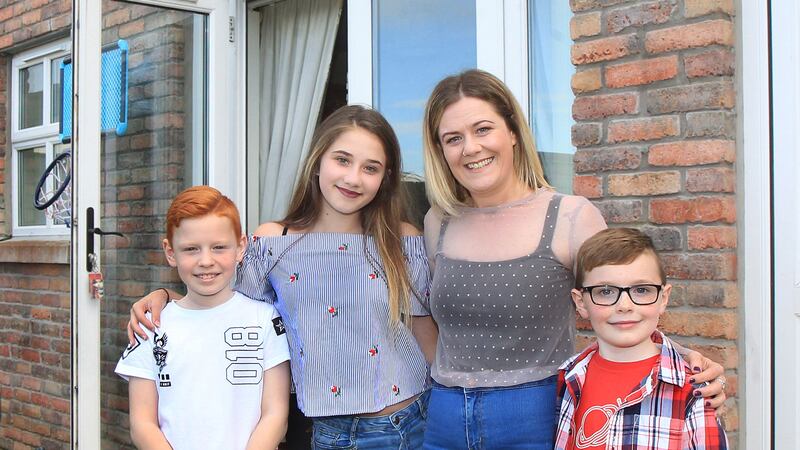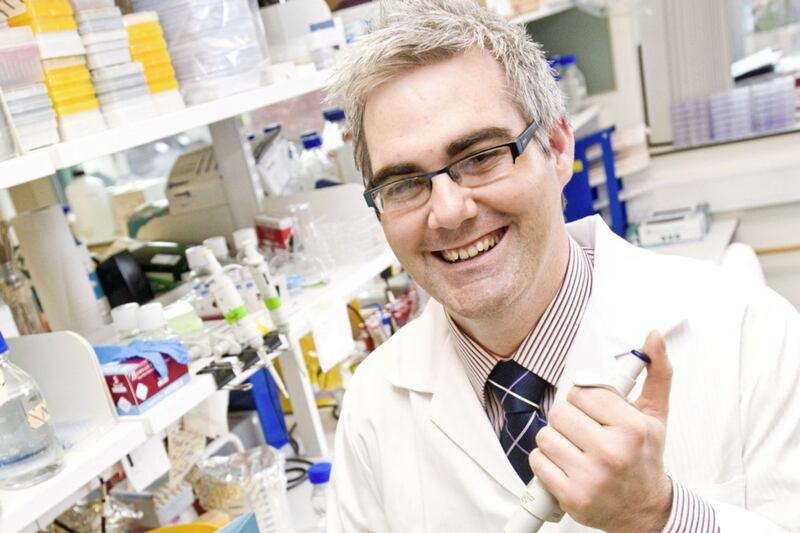BREAST cancer is the most common cancer in women in Northern Ireland – every year 1,300 are diagnosed and 300 lose their lives.
While women in the general population have a 12 per cent lifetime risk of developing breast cancer, having a BRCA mutation raises that risk to 50-85 per cent, with a high likelihood of recurrence or a second tumour.
These genetic mutations, first identified by researchers in 1994, can be passed to you from either your mother or father, and can increase the risk of cancers in both women and men, especially breast, ovarian and, in the case of BRCA2, fallopian cancer.
Research has shown that premenopausal women who have BRCA gene mutations and have had their ovaries removed reduce their risk of ovarian cancer by 85 per cent to 95 per cent.
Hollywood actress Angelina Jolie's decision to have a preventative double mastectomy in 2013 followed by surgery to remove her ovaries two years later to dramatically reduce her risk of developing ovarian cancer – the disease her mother died from in 2007 – brought the topic of BRCA genes to public attention.
Like Jolie, Ballymoney mother-of-three Kerrie Douglas has elected to have preventative surgery to reduce her risk of developing cancer.
Kerrie (35) has been waiting over 20 months to have a double mastectomy after she found out she has the BRCA2 gene.
“My nana on my father’s side took ill before Christmas two years ago and was being treated in hospital for COPD [chronic obstructive pulmonary disease]. They discovered that she had a mass on her breast which was diagnosed as breast cancer," she explains.
"When we looked back, there have been quite a number of women in the family who've died from ovarian and breast cancer over the years. One of my grandmother's nieces was diagnosed with BRCA2 and my nana said it might be wise for all of us to be tested.
"I'd known nothing about BRCA2 but once we started talking about being tested I did a bit of research on the internet myself up to date on the information. I had the test done and six weeks later the result came back positive. It was a huge shock and I’m still trying to come to terms with it."
After being referred to a genetics counsellor, Kerrie thinking of her three children, Mackenzie (15), Khalyn (nine) and eight-year-old Cade, quickly came to the decision to have preventative surgery.
"Watching my nana battle and loose her life to breast cancer, I didn’t feel there was any other choice. No-one wants to see someone they love get breast cancer and I would do anything to prevent putting my children through watching me fight the disease."
Kerrie has had a long, anxious wait for her surgery, heightened by news that her annual routine MRI scan and mammogram this August revealed "an area of concern".
"My date for surgery has been pushed back because so many people are being treated for cancer. Before the results of my recent scan I accepted the fact that waiting lists are long and I would just have to wait. This made me sit up and say: 'You know what, Kerry? You are just as important as anyone else'. So I referred myself back to my genetics counsellor and I have an appointment next month to meet a new surgeon, so hopefully the operation can happen sooner rather than later."
Kerrie has found great support on social media from others with the BRCA mutation and she closely follows medical research advances into the gene.
"I hadn’t realised how many other people have the mutant gene too. Before I felt it was only me but I’ve made a whole new network of friends online who you can share your problems and thoughts with," she says.
This month local charity Cancer Focus NI are encouraging people to get pink, to help raise money for pioneering breast cancer research at Queen's University Belfast.
"We have been funding research at Queen’s for a number of years. I would encourage the public to come together to support our In Pink campaign and do something pink to help continue our work into this devastating disease," says Rosie Forsythe, community fundraising manager for Cancer Focus NI.
"Even the smallest donation will help our researchers explore better ways to prevent breast cancer and find alternative treatments for high risk women who, at present, have to consider having a mastectomy to drastically cut their chance of cancer."
Kerrie encourages people to help fundraise.
"Research into this condition is so important. Obviously my own children will have to be tested now. I’m hoping that by the time they are grown up a lot more will be known about the condition – that it will be easier to detect and there will be better treatments.
"Preventative surgery can be devastating, particularly if you have no children. Hopefully in years to come people won’t have to go through what I’m going through," adds Kerrie who also plans to have a hysterectomy at a later date, to reduce her risk of developing ovarian cancer.
It is recommended that you consider getting tested for BRCA genes if one or more relatives (on the same side of the family) were diagnosed with the same kind of cancer, a BRCA1 or BRCA2 mutation, breast or ovarian cancer before age 50, both breast and ovarian cancer, or male breast cancer.
:: Sign up for your pink party pack, with a host of pink fundraising ideas at Cancerfocusni.org, call the fundraising team on 028 9066 3281 or email fundraising@cancerfocusni.org. If you’re worried about cancer call the Cancer Focus NI free Nurseline on 0800 783 3339.








